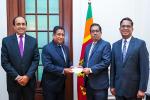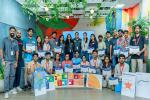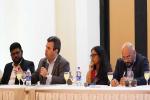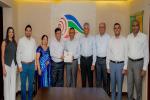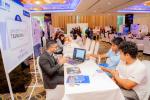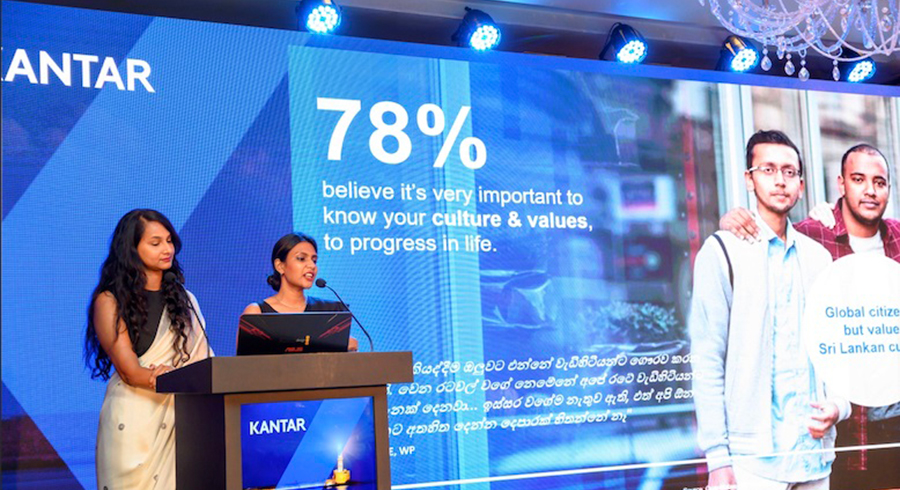The conference was attended by top leaders from a diverse range of brands present in Sri Lanka.
The distinguished guests included CEO, Kantar APAC - Leung Cheong Tai, Executive Managing Director, Insights Division, Kantar South Asia - Deepender Rana and the Executive committee of Kantar South Asia.
Head of Kantar Sri Lanka - Himalee Madurasinghe, emphasised the crucial necessity of comprehending the prevailing pulse of the people.
She explained the myriad experiences individuals have undergone in recent years, leading to unprecedented shifts in behaviour.
“The resultant impact on businesses has been profound, leaving little room for proactive planning or anticipation of these transformative changes.
While certain sectors show positive momentum, the journey towards reclaiming past levels of achievements is anticipated to be gradual.”
Madurasinghe emphasised that the profound understanding of consumers remains a paramount concern, given the evolving landscape.
“Notably, the emergence of Gen Z into the workforce introduces novel and intriguing behavioural patterns that demand thoughtful consideration from brands and their custodians”.
In reaffirming Kantar's commitment, Madurasinghe reiterated the company's dedicated role as a facilitator for providing invaluable insights into these nuanced dynamics.
CEO, Kantar APAC - Leung Cheong Tai, shared insightful observations with the audience, shedding light on three overarching trends prevalent in the APAC region.
With a succinct articulation, she outlined these trends as "Do more with less, Unlearn to build brands of tomorrow, and Do well by doing good.”
In his engaging address, Executive Managing Director, Insights Division South Asia - Deependra Rana, presented a compelling perspective on the integration of artificial intelligence within KANTAR, aptly titled "KANTAR and Artificial Intelligence – Future is Here".
Rana illuminated how this technology serves as a catalyst for "Generative AI = Humanizing EI (Enhanced Intelligence)", ushering in a paradigm where AI enhances human capabilities.
The evening's focal point was the exchange of information and insights encapsulated within the theme – GEN Z – Unravelled.
Shevanie Senanayake and Nuwani Jayasuriya skillfully took the audience through a captivating presentation.
"Gen Z, the demographic cohort aged between 11 to 26 years, took centre stage in our exploration, with a specific focus on those aged 15-26 for this study, constituting 23% of the population.
These Gen Zers emerged as alchemists, reshaping the societal norms of Sri Lanka.
While Gen Z can sometimes be enigmatic, they represent a puzzle, embodying a complex and multi-faceted identity composed of various pieces that together form a cohesive whole.
Our exploration delved into five distinct facets of this generation, casting light on their identity."
The facets categorised as Neo-Traditional, Aspirant, Go-Getter, Phygital (Physical and Digital), and Explorer, offered a nuanced understanding of Gen Z.
The study not only reaffirmed known behaviours but also unveiled new perspectives, empowering marketers and businesses to appreciate the significance of these findings for making informed decisions.
Gen Z and Gen Y make up 50% of Sri Lanka’s population with 25% being Gen Z.
As per Kantar’s National Demographic and Lifestyle Survey (NDLS), Gen Z is present in 58% of our households and is not only influencing the buying power shift, but they are also a part of a large-scale cultural shift.
The Study showcased that religion is a key pillar and spirituality is held dear with 92% of Gen Z’ers saying – ‘Faith guides my life’. In addition, while culture is important to Gen Z, their need to progress is not held back by tradition.
They are considerate of others but do not want to be restricted by unreasonable social norms, such as opinions on attire, grooming, and the company they keep, in particular, they do not judge and wish not to be judged.
An overarching commonality is that Gen Z are passionate about creating positive change.
They are not politically aligned, but keen to have their voice heard.
This applies to many aspects of their lives, be it the products they use, the brands they love or hate and even what they experience in everyday moments.
Gen Z are exposed to career options available to them and are also aware of the competitiveness of the job market.
They aspire to gain qualifications, with 55% aspiring for a degree or a higher qualification.
Employers can expect individuals who are qualified yet still hungry for more qualifications.
They prioritise freedom and independence, with 63% aspiring to be entrepreneurs.
However, this pursuit of independence alone may not guarantee business success; despite knowing their goals, they look for guidance to acquire the necessary knowledge.
Almost half of Gen Z are in the workforce at present, however, they have clear expectations of work conditions, where pay takes precedence, but flexibility and working hours are also considered important.
These factors entice Gen Z towards a job and encourage them to remain there.
Gen Z lives with technology and has a strong online presence.
94% of them are on the internet daily which is their preferred source of information.
As a result of this Gen Z have wide exposure to International movies, celebrities, advertisements, pop culture, and music at a younger age.
It shapes their thinking behaviour and the way they act and experience the world.
At the same time, it is interesting to note that Local content is consumed across digital and traditional media – 49% watch daily local content on TV while 44% consume it through social media.
Being globally exposed to topics such as equality, sustainability and social awareness encourages Gen Z to connect with brands that are ethical, eco-friendly, and better for the community.
Most are willing to reject brands that are unethical and stop following celebrities and influencers who cross the line.
Each generation plays its part in upholding and adding to our culture and values; now, Gen Z stands as the resounding voice of the nation.

